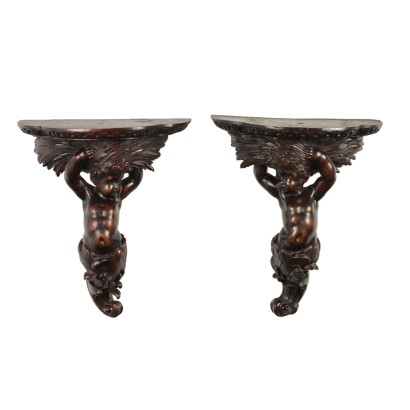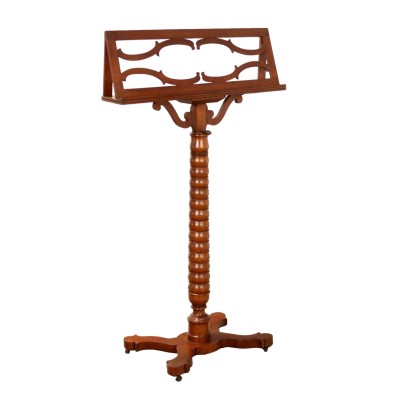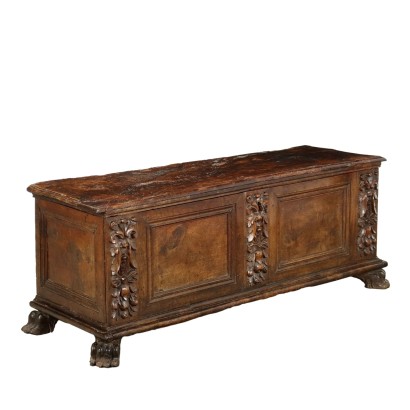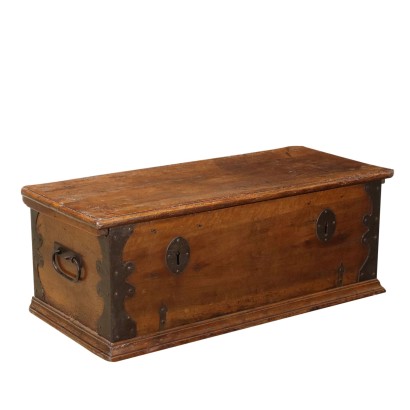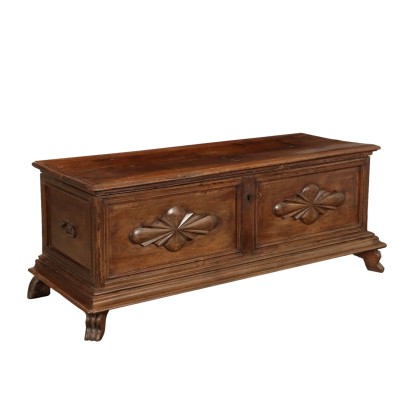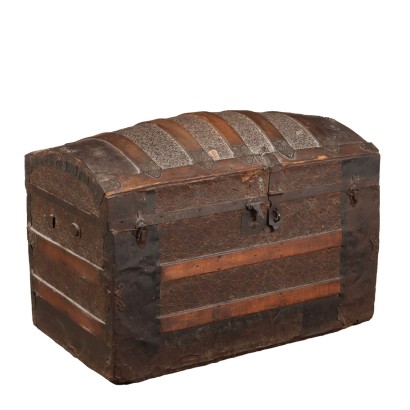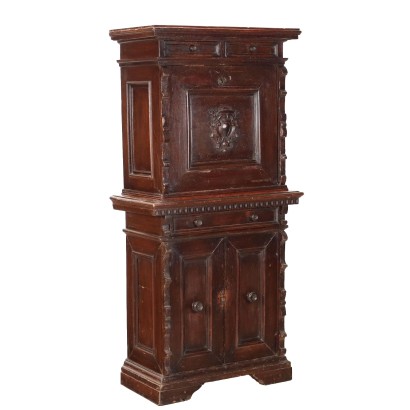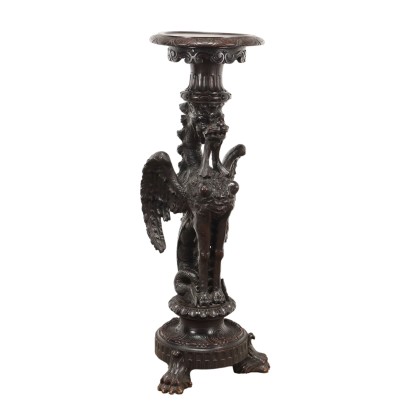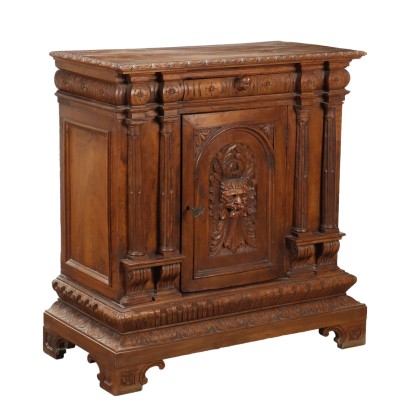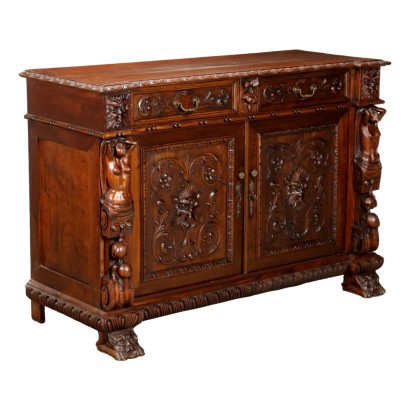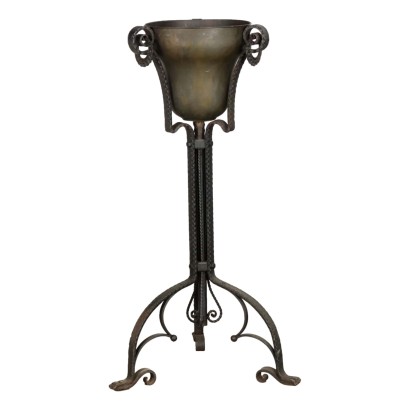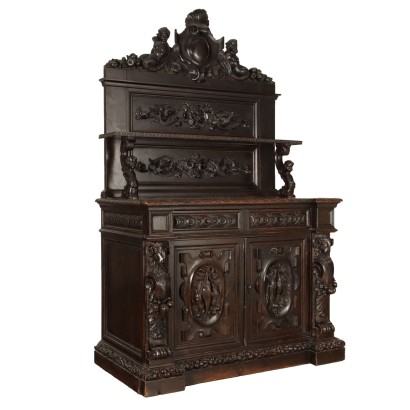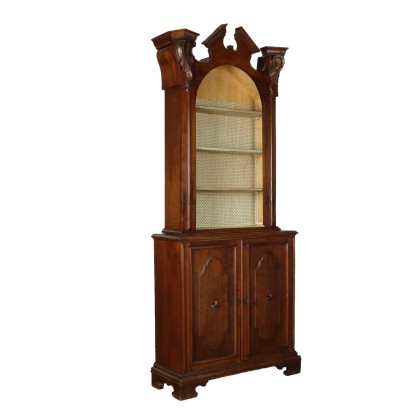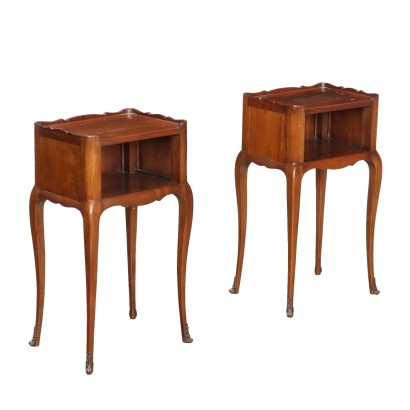Pair of Antique Neo-Renaissance Shelves Walnut '800 - Italy, Late XIX Century
Features
Italy, Late XIX Century
Style: Neo-Renaissance (1820-1890)
Age: 19th Century / 1801 - 1900
Origin: Italy
Main essence: Walnut
Material: Carved Wood
Description
Pair of neo-Renaissance hanging shelves in carved walnut, Italy, late 19th century. The two mirrored shelves depict a putto intent on holding up a bundle of plants, the latter being a support base for the shaped and podded top. The two putti also seem to emerge from a leaf cone ending in a curl.
Product Condition:
Product which due to age and wear requires restoration and re-polishing. We try to present the real state of the furniture as completely as possible with photos. If some details are not clear from the photos, what is stated in the description applies.
Dimensions (cm):
Height: 42
Width: 37
Depth: 21
Additional Information
Style: Neo-Renaissance (1820-1890)
Nineteenth-century revival and revaluation of forms and stylistic features typical of the Renaissance.Find out more with the insights of our blog:
Classic Monday: a neo-Renaissance sideboard in dialogue with the past
The dictionary of antiques - Savonarola
INSERT ADDITIONAL LINKS
The Austrian taste of Baroque
Antiques and the history of collecting
Collecting in the 20th century
Age: 19th Century / 1801 - 1900
19th Century / 1801 - 1900Main essence: Walnut
Walnut wood comes from the plant whose botanical name is juglans regia , probably originally from the East but very common in Europe. Light or dark brown in color, it is a hard wood with a beautiful grain, widely used in antique furniture. It was the main essence in Italy throughout the Renaissance and later had a good diffusion in Europe, especially in England, until the advent of mahogany. It was used for solid wood furniture and sometimes carvings and inlays, its only big limitation is that it suffers a lot from woodworm. In France it was widely used more than anything else in the provinces. In the second half of the eighteenth century its use decreased significantly because mahogany and other exotic woods were preferred.Material: Carved Wood
Other customers have searched:
Altri mobili antichi, toilette antica, inginocchiatoio antico, baule antico, inginocchiatoio, mobili antiquariato, mobili antichi, bauli, cassapanca..
Se ti interessano i mobili d'antiquariato Scopri qui tutte le presentazioni dei prodotti d'antiquariato più belli, eleganti e preziosi su FineArt by Di Mano In Mano
Leggi di più
Sull'antiquariato in generale dai un'occhiata anche a:
Antiquariato: una sezione per raccontare i mobili antichi che sono arrivati fino ai giorni nostri.
Classic Monday: da un pezzo dei nostri magazzini alla storia dell'antiquariato
L'antiquariato dalla A alla Z: il Dizionario dell'Antiquariato
Il dizionario dell'antiquariato - Lastronatura
Il dizionario dell'antiquariato - Mascherone
Il dizionario dell'antiquariato - Natura morta
Il dizionario dell'antiquariato - Opificio
Il dizionario dell'antiquariato - Pastiglia
Il dizionario dell'antiquariato - Savonarola
Il dizionario dell'antiquariato - Rosone
Intaglio barocco con motivo a ricciolo
Infine, dai un'occhiata alle nostre rubriche di divulgazione sulla storia delle arti decorative e d'arredo:
Epoche
Lavorazioni e tecniche
Mostre ed Eventi
Protagonisti
Leggi di più
Sull'antiquariato in generale dai un'occhiata anche a:Antiquariato: una sezione per raccontare i mobili antichi che sono arrivati fino ai giorni nostri.
Classic Monday: da un pezzo dei nostri magazzini alla storia dell'antiquariato
L'antiquariato dalla A alla Z: il Dizionario dell'Antiquariato
Il dizionario dell'antiquariato - Lastronatura
Il dizionario dell'antiquariato - Mascherone
Il dizionario dell'antiquariato - Natura morta
Il dizionario dell'antiquariato - Opificio
Il dizionario dell'antiquariato - Pastiglia
Il dizionario dell'antiquariato - Savonarola
Il dizionario dell'antiquariato - Rosone
Intaglio barocco con motivo a ricciolo
Infine, dai un'occhiata alle nostre rubriche di divulgazione sulla storia delle arti decorative e d'arredo:
Epoche
Lavorazioni e tecniche
Mostre ed Eventi
Protagonisti
Product availability
The product can be seen at Cambiago
Immediate availability
Ready for delivery within 2 working days from ordering the product.



